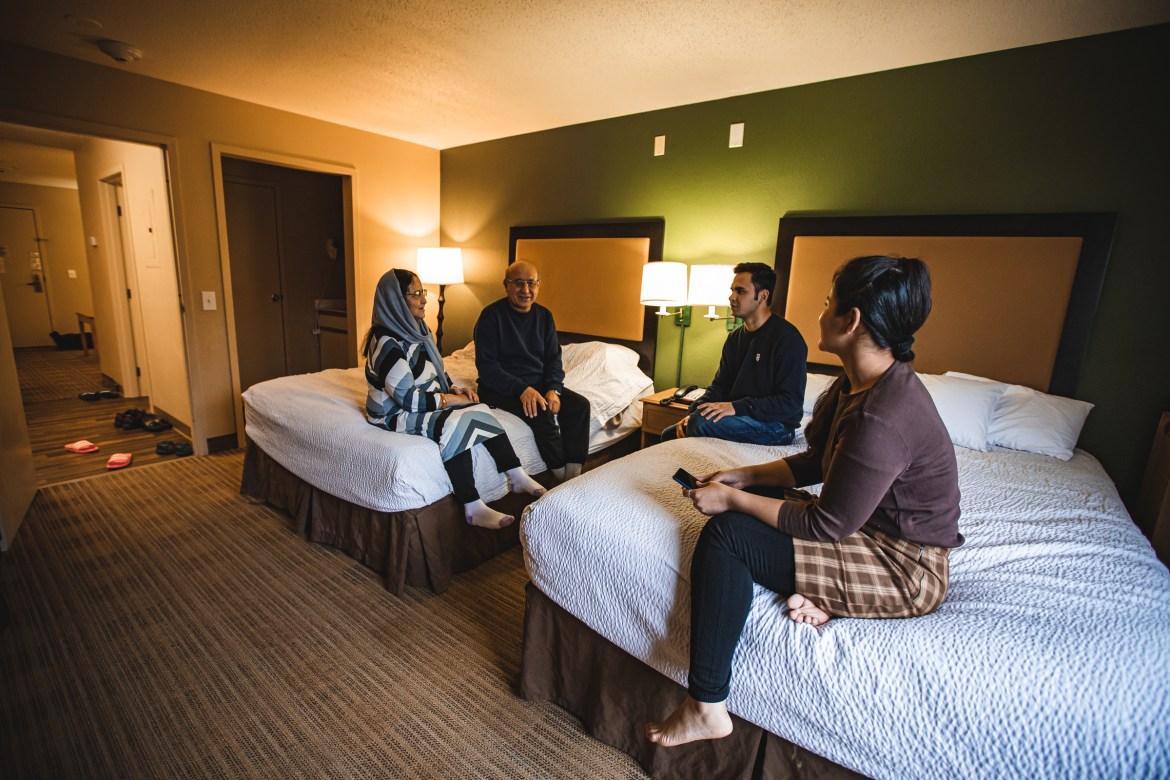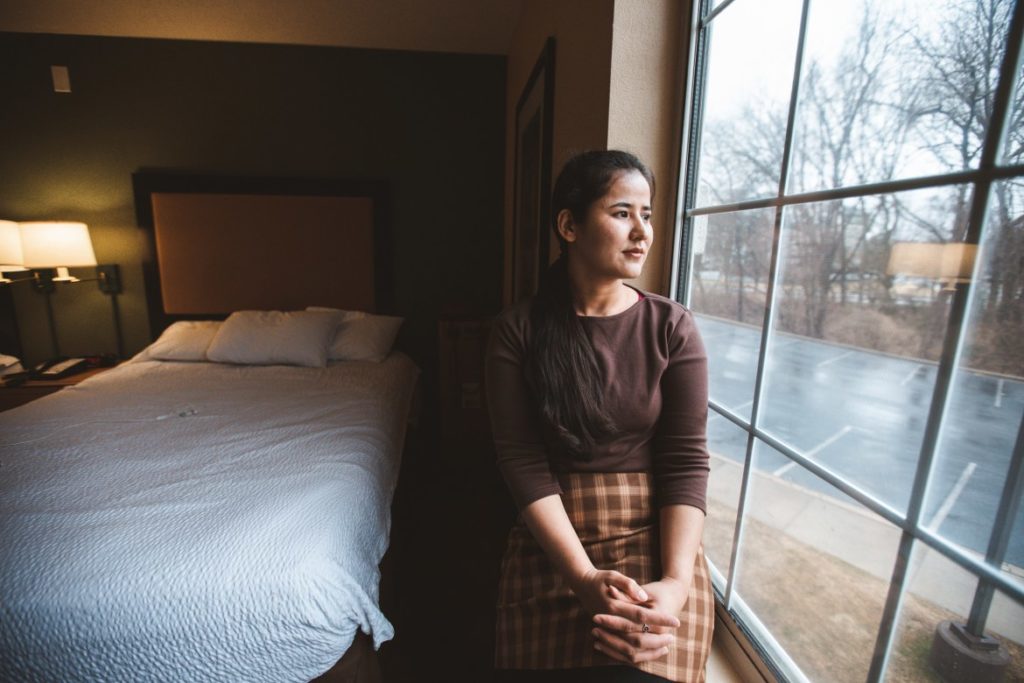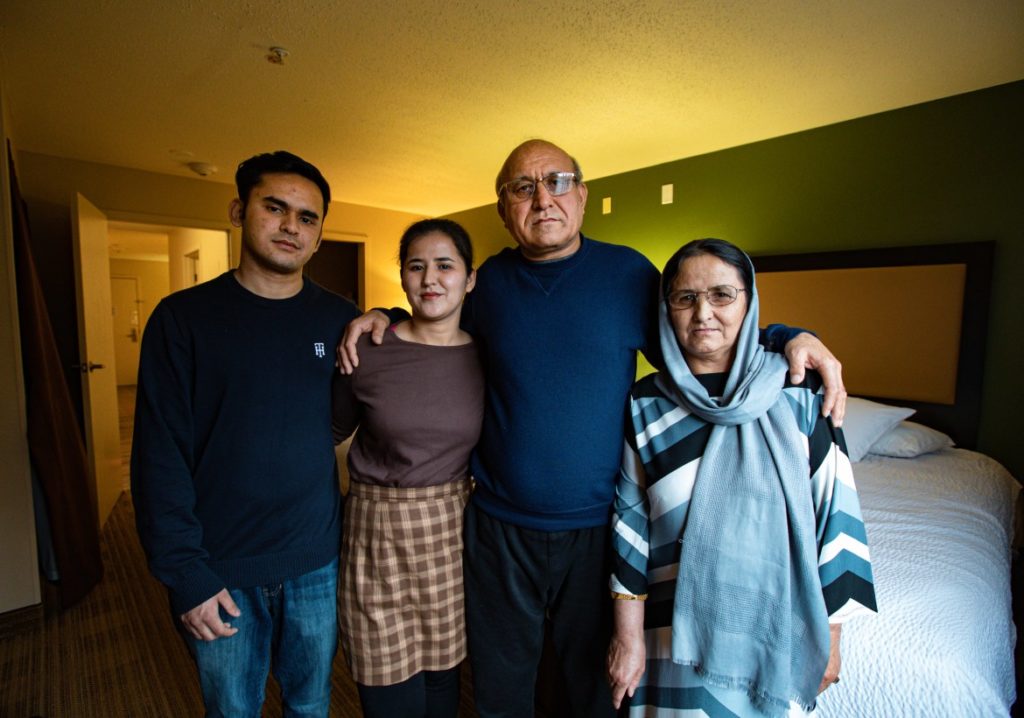
By Zhen Wang
Wisconsin Watch
As she counted down the final hours of her stay at Fort McCoy, a 60,000-acre Army base in rural Monroe County, Wisconsin, Lamha Nabizada searched for an interesting place to pose for a photo at this reporter’s request. The task wasn’t easy.
“Everywhere is the same thing, same barrack — white, white barrack,” the 27-year-old told Wisconsin Watch.
Venturing outside into frigid air, she posed in front of a flagpole and gun turret. White letters spelling FORT McCOY blended into the snow blanketing the ground.
It was Feb. 6, the day before Nabizada and her 22-year-old brother Masroor would fly from Minneapolis to Dulles Airport in Virginia, and then travel to Maryland — continuing a resettlement journey that began last August when the Taliban took over Afghanistan’s capital of Kabul, accelerating a humanitarian crisis. They were among tens of thousands airlifted from the country with passports, legal documents and little else.
Nearly six months later, the siblings were among the last to leave Fort McCoy, which housed as many as 12,600 Afghans at its peak.
Lamha felt mixed emotions as she prepared to leave the base: excitement to ditch the monotony, hope for new opportunities — and anxiety about moving to a place where she doesn’t know anyone.
“I don’t know what will happen in the future,” she said.

On Feb. 15, Fort McCoy became the seventh of eight U.S. military installations to send its final evacuees to host communities. Four days later, the eighth base — in New Jersey — cleared out the last of the 76,000 total evacuees who arrived for the largest American resettlement operation since the Vietnam War.
Through Feb. 23, Wisconsin had resettled about 820 of the 850 Afghan evacuees currently slated for the state, according to Bojana Zorić Martinez, director of the Wisconsin Department of Children and Families’ Bureau of Refugee Programs.
Zorić Martinez said the difficulties of serving so many evacuees at once has prevented resettlement from proceeding more quickly. Aside from housing, they need Social Security numbers, jobs, food and other basic items — and help applying for permanent residency.
Evacuees are eligible to apply for benefits available to refugees, according to the federal Office of Refugee Resettlement. That includes job preparation, English language training and medical aid. They may also be eligible for mainstream federal benefits such as Medicaid and food assistance.
Zorić Martinez said the system shrunk under Trump, who enacted more than 1,000 immigration-related policies that largely slowed new arrivals, according to the Immigration Policy Tracking Project. That included slashing the country’s refugee cap each year he was in office, which meant less money for resettlement agencies.
“(It was) just very much a concerted effort to damage the immigration, (and) the refugee programs in the country,” she said. “We are now seeing the consequences of that.”
Family separated

Lamha and Masroor Nabizada moved to the Washington, D.C. suburb of Rockville, Maryland — sharing two hotel rooms with their parents, who left Fort McCoy a week before the siblings.
The family’s lengthy to-do list includes securing stable housing, jobs and permanent residency as the federal government processes a crush of applications from the Afghans admitted under the two-year humanitarian parole program.
If only the Nabizadas could confront those challenges together.
Lamha and Masroor’s oldest sibling, 34-year-old Khushnood — who served as a diplomat, owned a news outlet and was on a Taliban hit list in Afghanistan — now lives 120 miles away in Richmond, Virginia. That’s where he, his pregnant wife Razia and their three children were sent when they left Fort McCoy in December.
The International Rescue Committee (IRC), the nonprofit resettlement agency handling the Nabizadas’ cases, did not make any employees available for an interview. In a written statement, the agency said it could not comment on the family’s separation but cited the difficulties of resettling thousands of evacuees in communities that lack affordable housing — on top of trying to help refugees from other countries.
“The resettlement of Afghans is one of the most complex, massive, and unprecedented logistical and humanitarian challenges in American history,” spokesman Stanford Prescott said in the statement.
IRC has resettled 1,750 Afghans in Virginia and Maryland alone — a 310% increase from the number of refugees it served in the previous fiscal year. The full Nabizada family requested resettlement in Virginia because of its vibrant Afghan communities, including some of their own friends and family. But housing quickly filled up.
“Many Afghan cases initially assigned to resettlement agencies in Virginia were reassigned to other states where more capacity was available to serve them, and there were additional housing and job opportunities,” the IRC statement said.
Ending up in Maryland leaves Lamha distraught.
“We don’t have any kind of a community,” she said. “We wanted to be housed together with our community and our family.”
Her story is typical within the overwhelmed, understaffed resettlement agencies, resettlement officials say.
“They’re splitting up families because they don’t have the room,” said Sheila Badwan, vice president of the Milwaukee chapter of the Hanan Refugee Relief Group and a national executive committee member. “It’s really chaotic right now.”
Badwan’s group has helped find homes and supplies for 60 families resettling in the Milwaukee area, which has received a total of 400 Afghans.
Long wait at Fort McCoy
Throughout much of 2021, Lamha Nabizada had no sense that her life would dramatically change. Holding a master’s degree in business administration from Afghanistan’s largest private university, she was living and working in Kabul as a business manager for an insurance company.
By mid-August, she and her family had left Afghanistan with little more than their lives.
Like other evacuees, the Nabizadas underwent security vetting overseas. After U.S. Embassy officials helped them reach the Kabul airport, they flew to Qatar, Germany and eventually the United States. Once at Fort McCoy, they waited. And waited — for nearly half a year.
Nabizada, who speaks English, fought boredom by teaching the language to 15 Afghan children. In October, she volunteered for an on-site legal clinic sponsored by the United States Conference of Catholic Bishops, helping fellow evacuees prepare paperwork and translate documents.
Winter in Wisconsin brought snow, bitter cold and fewer daylight hours, leaving Nabizada and others mostly stuck indoors. After working days at the legal clinic, she spent nights reading borrowed books, including the classic “Stuart Little,” the philosophical collection “This I Believe” and the Nicholas Sparks novel “See Me.”
Lamha and Masroor Nabizada said Fort McCoy treated them well. They received enough food but not always enough winter clothing. The base offered movie nights, indoor recreation, sewing rooms, dance classes and other events. “At least they tried, and they did as much as they could,” Lamha said.
Still, base life felt like a “jail,” Masroor said. Fearing COVID-19, he rarely spent time outside of the barrack and dining facility.
Each month, the family heard predictions that they would leave soon.
‘Why couldn’t they bring them here?’
That day first arrived for Khushnood’s side of the family, who may have received medical priority because of Razia’s pregnancy. In late December, they arrived in Richmond. An estimated 8,500 Afghans have laid roots in Virginia since 2016, according to the state refugee resettlement program.
The rest of the family would not be coming.
“I don’t know what happened at the last minute,” Khushnood said. “Why couldn’t they bring them here? That’s a question for me.”
The family could not simply leave Fort McCoy early to follow Khushnood to Richmond — outside of the IRC-organized resettlement process. That could have jeopardized the crucial federal aid allocated for Lamha, Masroor and their parents. And in early December, IRC’s Richmond office said it would no longer serve new “walk-in” evacuees arriving unscheduled to the city, unless immediate family in the area provided permanent housing.
Without jobs and few possessions, the family couldn’t afford to risk losing financial assistance, sparse as it is.
The federal government provides resettlement agencies $2,275 per evacuee for housing, job training and other expenses over three months, including $1,050 that stays with the agency to cover administrative costs. Each evacuee gets a portion of the remainder in cash, which is not adjusted for differences in cost of living.
The four Maryland Nabizadas collectively received $1,000 in pocket money, and IRC is reserving the rest of the funds to pay their rent, Lamha said. She’s not sure how the funds will stretch far enough in such an expensive region of the country.
“No one is clarifying to us,” she said.
IRC has delivered some food, but it’s not enough. And the nearest grocery store is a 20-minute walk away.
Still, the family remains generous. When a photojournalist visited Feb. 22 on Wisconsin Watch’s behalf, the family offered her one of their last pieces of fruit.
In Virginia, Khushood said his five-member household received $1,055 in total cash, and IRC is covering three months of rent at their three-bedroom townhouse at $1,700 per month.
System weakened, then shocked
After the country resettled about 85,000 refugees in 2016, just 11,400 arrived under Trump in 2021 — the fewest since the modern refugee program took shape in 1980, according to the National Immigration Forum. President Joe Biden has since raised the ceiling to 125,000, which does not include Afghan evacuees.
The resettlement system includes federal and state agencies and national and local nonprofits. With less work under Trump, the nine national refugee nonprofits scaled down operations to survive — with some closing offices and laying off staff.
Then came Biden’s troop withdrawal, which allowed the Taliban to quickly take Kabul, necessitating a last-minute push to airlift evacuees to safety. Biden’s critics say he miscalculated the strength of the Taliban — and that he should have begun the evacuation sooner.
The Taliban takeover shocked a system that will take years to rebuild, Zorić Martinez said.
“I don’t think we’re even halfway to where we need to be,” she added.
Grassroots groups are helping to fill the gaps — aiding in housing searches, collecting donations and organizing friendly welcomes from community members. But questions loom for many newly arriving Afghans, including when they will find housing and whether they will gain permission to stay permanently.
“The government has to provide more resources, if we’re going to ensure that everybody has their basic needs met during this transition time, and it’s wonderful to see people in the community coming together,” said Erin Barbato, director of the Immigrant Justice Clinic at the University of Wisconsin Law School. “But that’s not going to solve the problem for everybody.”
The legal clinic is helping evacuees file for asylum and training attorneys to represent them in that process — positions that are in short supply. Barbato and other immigration experts fear some people will fall through bureaucratic cracks unless the federal government takes action to stabilize the system.
By Jan. 31, about 2,200 evacuees remained at Fort McCoy, according to base spokesperson Lt. Michael Miller. A U.S. State Department push helped empty the base within two weeks — even though resettlement agencies had yet to iron out details in some host communities.
On Feb. 7, Lamha and Masroor Nabizada boarded a 2 a.m. bus with 40 other Afghans. They traveled through the darkness to their next stop, the Minneapolis airport.
Searching for housing
Khushnood Nabizada worked quickly — and independently — once he arrived in Richmond in December. He applied for a driver’s license, set up health care for Razia, shopped for groceries and enrolled the children in school while beginning his job search.
His IRC case manager didn’t visit but called a few times to check up on him, Nabizada said.
“They don’t have enough people to work on refugee cases,” he said. “That’s realistically a big mess. Then, they can’t meet the minimum expectations of what should be done.”
He used an online search tool to find the townhouse he’s renting.
Securing housing is particularly tough for evacuees — people who arrive with no credit or rental history, said Badwan of the Hanan Refugee Relief Group. Nabizada said his landlord was generous enough to choose him over applicants with a better financial track record.
Meanwhile, inflation is pushing rent higher, worsening chronic housing shortages nationwide. That includes Milwaukee, where more than half of tenants are “rent burdened,” meaning that they spend more than 30% of their income on rent, according to a 2021 Wisconsin Policy Forum analysis.
Badwan said her group, partnering with two local resettlement agencies, has built relationships with landlords and tapped a network of over 100 volunteers to help Afghans find homes in Milwaukee.
But many evacuees across the country are still living in cramped hotels continuing their housing search. That includes the Nabizadas in Maryland, where the housing crunch is particularly serious. The Washington Post reported in February that about 40 Afghan families were living in a Baltimore-area hotel since October — still waiting on the IRC to locate permanent housing that they considered safe.
The Nabizadas turned down one option — a two-bedroom apartment in a suburban apartment complex — after Afghans living there complained about loud noises that Lamha feared would disturb her parents.
She is searching for a better match, but that’s difficult without a car, computer or knowledge of the area. The family may be moved to the rejected apartment unless they find another option soon.
Her chief concern, however: the 18 months remaining to secure permanent residency.
Applying to stay
Nearly 37,000 humanitarian parole evacuees could qualify for a Special Immigrant Visa, while some of the remaining 36,400 might qualify for asylum, according to a Department of Homeland Security report.
Lamha is seeking asylum while Masroor is applying for a Special Immigrant Visa due to his previous work as a Department of Defense contractor.
Barbato, the UW legal clinic director, said the two-year parolee status leaves evacuees vulnerable to future deportation — a potentially deadly proposition. The U.S. asylum program last year faced a backlog of nearly 413,000 applications.
The federal government remains responsible for helping evacuees move through that bureaucracy, Barbato said. That could include enacting an Adjustment Act to grant permanent legal residency specifically to Afghan evacuees.
Congress has historically passed such laws to protect evacuees from U.S. military conflict zones, including in Vietnam and Iraq.
Echoing immigration advocates and veterans, Barbato said an Afghan Adjustment Act, which has yet to be introduced in Congress, could pave a safer, quicker path to citizenship. Lawmakers must also inject more resources into the immigration bureaucracy, she added. How these resources are allocated will shape the fate of applicants who have waited years in the queue — as well as new Afghan arrivals.
New life, new opportunities
Khushnood Nabizada is approaching life in Richmond with optimism and an open mind.
“I need to build my career here. …Whatever I did in the past in my country is totally irrelevant to what the community here needs,” he said. “Anywhere you’re at peace, that is your home, no matter where it could be.”
Citing his siblings’ education and work ethic, he expects them to succeed as well.
As winter winds down with promises for warmer weather, the Nabizadas have another reason for excitement: the new baby, due in June.
Despite the stress and distance from Khushnood, Lamha is staying positive and hopes to find freedoms that were absent from Afghanistan.
“It’s a new opportunity for us,” she said. “And a good thing for Afghan women (in the U.S.) is that we have equal rights.”
Eman Mohammed contributed reporting. The nonprofit Wisconsin Watch (www.WisconsinWatch.org) collaborates with WPR, PBS Wisconsin, other news media and the University of Wisconsin-Madison School of Journalism and Mass Communication. All works created, published, posted or disseminated by Wisconsin Watch do not necessarily reflect the views or opinions of UW-Madison or any of its affiliates.



